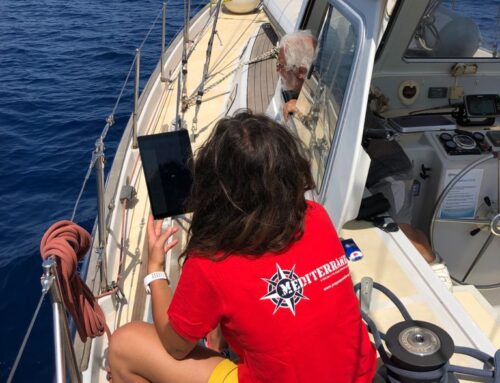 The Mediterranean Sea, despite constituting only 0.8% of the global ocean surface, is a unique marine basin in the world, characterized by a high biodiversity because it hosts up to 18% of all known marine species, many of which are endemic. Due to its conformation and geographic arrangement, however, it is a particularly fragile marine district, subjected to strong anthropogenic pressure, in which the effects of global warming risk being more extreme than elsewhere. It is therefore an ecosystem that deserves high priority for research and conservation.
The Mediterranean Sea, despite constituting only 0.8% of the global ocean surface, is a unique marine basin in the world, characterized by a high biodiversity because it hosts up to 18% of all known marine species, many of which are endemic. Due to its conformation and geographic arrangement, however, it is a particularly fragile marine district, subjected to strong anthropogenic pressure, in which the effects of global warming risk being more extreme than elsewhere. It is therefore an ecosystem that deserves high priority for research and conservation.
Spot the Monk, the project with a highly innovative format by dr. Elena Valsecchi, PhD Molecular Ecology of Department of Environmental and Earth Sciences of the Milano-Bicocca in which we are involved this year, includes a program of sea water sampling with a manual pump during the navigation of Mediterranea, from which the researchers will extract the DNA of the organisms present. Therefore Zero invasiveness towards the marine environment and Zero additional emissions.
The name of the project is dedicated to the monk seal, the most threatened pinniped in the world and the only one present in the Mediterranean, where its distribution and abundance have undergone a drastic decline in recent decades. Data on its status are scattered and scarce due to both its rarity and its evasiveness. A project that safeguards the marine environment because biological information will be acquired not by taking organisms from the sea, but by analyzing environmental DNA (eDNA). Today, in fact, molecular biology techniques make it possible to detect and quantify small amounts of traces of DNA released into the environment (eDNA) by any organism (a bit like us when we lose hair and horny scales in the environment in which we live). A green project, as they say, that is carried out in conditions compatible with the environment, without the use of electrical machinery or energy deriving from hydrocarbons, but with only the energy deriving from our muscles to use the pump and from the wind that pushes Mediterranea along the route. An economically sustainable project both because even if it is centered on the research of the DNA of the monk seal, it also allows the research of the DNA of all other marine organisms, greatly expanding the field of research at no cost, and because it is carried out – at least in part – by volunteers, such as we at Progetto Mediterranea.
 How, then, does the collection of sea water take place? By simply sucking with the manual pump samples of sea water at the points where we intend to detect the composition and abundance of biodiversity, either on the recommendation of the researchers, or randomly during the anchoring of Mediterranea for the night or for mere recreational purposes (a bath in sea is also made for Science!).
How, then, does the collection of sea water take place? By simply sucking with the manual pump samples of sea water at the points where we intend to detect the composition and abundance of biodiversity, either on the recommendation of the researchers, or randomly during the anchoring of Mediterranea for the night or for mere recreational purposes (a bath in sea is also made for Science!).
Progetto Mediterranea therefore continues to be an opportunistic sampling platform – as it was for plankton sampling along the 2013-2019 route – capable of reaching coastal areas much more closely than a real research vessel, with a saving of energy, time and resources. The Mediterranea route is also particularly favorable for Spot the Monk, as it involves multiple passes on the same navigation points at different times. For example, the 2021 route has foreseen the circumnavigation of Corsica, as well as that of Sardinia, twice. This allowed us to sample at different times, in different areas, but also in the same sea spaces. In this way it is possible to observe any variations in the passage of seals or other large cetaceans.
 The collaboration between Progetto Mediterranea and Milano-Bicocca University provides a non-invasive and highly sensitive tool to define the effective distribution of the monk seal, its recovery rate and to identify the locations in which to prioritize conservation, research and training initiatives. of citizens.
The collaboration between Progetto Mediterranea and Milano-Bicocca University provides a non-invasive and highly sensitive tool to define the effective distribution of the monk seal, its recovery rate and to identify the locations in which to prioritize conservation, research and training initiatives. of citizens.
That is why we believe that the Spot the Monk project is a true advanced citizen science project and we are very proud to be part of this experience.
The first results deriving from the withdrawals obtained in the first part of the 2021 Route will be previewed during the Progetto Mediterranea event in Sardinia, in Cagliari on 17-18 September.





Leave A Comment